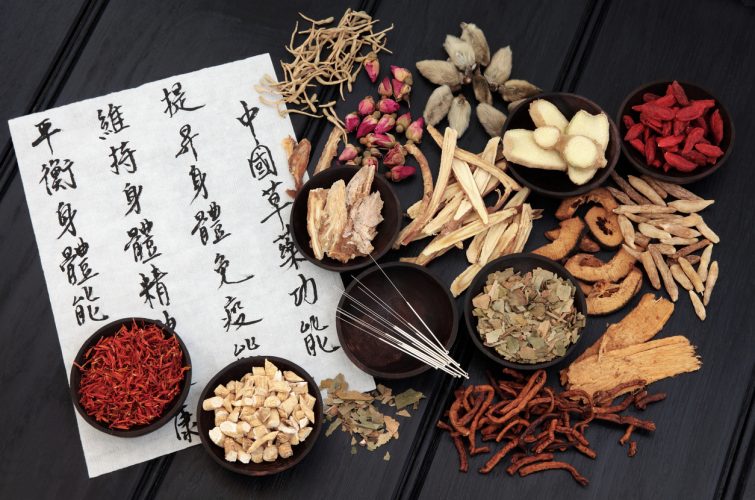 Acupuncture needles with chinese herbal medicine selection and mandarin calligraphy script on rice paper describing the medicinal functions to maintain body and spirit health and balance body energy.
Acupuncture needles with chinese herbal medicine selection and mandarin calligraphy script on rice paper describing the medicinal functions to maintain body and spirit health and balance body energy.
The main treatment tools of TCM are herbal medicine and acupuncture, but diet and lifestyle corrections are also used in treatment as well as for prevention.
Late autumn and winter are of course cold and flu season, and we’ve definitely seen plenty of this over the last few months.
One of the core theories of Chinese medicine is that of Yin and Yang. If Yin is your material self, your physical mass, then Yang is the warmth and energy and function and spark applied to that material mass … to give life. Both yin and yang are equally important and each depends upon the other. But yang ebbs and flows relative to yin with the time of day, within the menstrual cycle for women, and seasonally. In spring and summer yang moves out and is more active. In autumn and winter it moves inwards and is more dormant.
Colds and flus – With yang internalizing, a less “aware” immune system, combined with more cold and wind in the environment challenging our ability to stay warm, means we are at a higher risk of getting sick.
Cold extremities – Less yang on the surface means less warmth and blood flow to the joints and extremities. For some this can be cold and hands and feet. For others this can take a more extreme form in the form of Raynaud’s disease or chilblains. Arthritic conditions tend to be more problematic in winter too, with joints becoming more stiff and achy in the cold and damp.
Chronic lung issues – asthma and any chronic lung issues tend to worsen in winter.
Depression – Modern medicine might call this vitamin D deficiency. Chinese medicine says a relative lack of yang means a deficiency of the emotion of joy.
A famous saying in Chinese medicine cautions against digging a well only after you are thirsty, or forging weapons after battle has begun. Yes prevention is better than cure, it will save you from getting sick as often. While looking after yourself and supporting your health on the whole are important for preventing illness, these diet and lifestyle interventions also determine how an illness plays out once you do get sick. They are the difference between a head cold being a minor sore throat and sniffle for 2 or 3 days, versus being bed ridden for 5 days, followed by a month of fatigue.
Sometimes pathogens come along that are stronger than us. That’s part of being human, and good for developing our immune system. The real test of our immune strength in these cases, though, is how efficiently we process that pathogen and recover.
Just as animals in the natural world hibernate and become less active during winter, and just as plant
grow slows and even becomes dormant, we too should slow down. Spring and summer should be our time for intensive exercise, and activity, and busyness. Autumn and winter on the other hand is when we should do less. A lighter schedule. Wrap up the day earlier. Exercise and movement is still important but it can be less frequent and less intense.
Eat warm pungent flavours – that’s warm and slightly spicy foods like ginger, black pepper, turmeric, curry, onion and garlic, cinnamon, chilli etc. These foods warm the body, stimulate blood flow and strengthen the immune system.
Limit alcohol and sugar intake – both of these degrade the immune system and cause weight gain.
Choose cooked foods over raw foods – Cooked food has a more warming nature. The odd salad is fine, but don’t overdo the juices and smoothies etc.
Restrict physically cold food and drink – Go for drinks at room temperature or warmer rather than
straight out of the fridge. Likewise, frozen deserts like ice cream aren’t the best option.
Go for high nutrient density – lots of vegetables, across a diverse range. Also add in some animal
protein – think slow cooked soups, casseroles and curries etc
If colds and flus tend to move on quickly for you, the main aim is nutritious food and rest. Pushing through a cold and not taking adequate rest is likely to result in a longer recovery time. If you know viruses tend to linger with you, and go to the chest, or end up stuck in the sinuses, or result in ongoing fatigue, jump on some external help as soon as possible. It’s easier to treat at day 2 or 3 than at week 2 or 3. Chinese herbal medicine can be useful initially at treating a bacterial or viral infection, and then afterwards at ushering out remaining symptoms like fatigue, cough, sinus congestion.
Dr Christopher Booth (Chinese med.) practises traditional Chinese medicine in both Orange and Bathurst. To discuss treatment or make a booking please call Chris on 02 6361 9069, or visit website here.